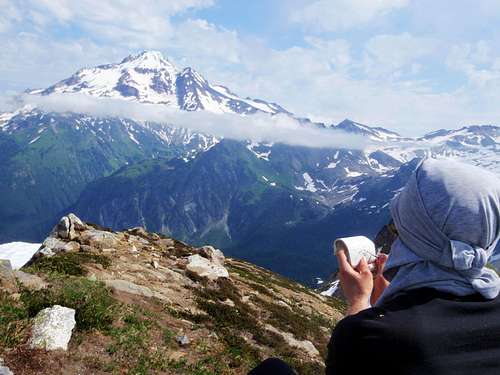-
 16325 Hits
16325 Hits
-
 84.27% Score
84.27% Score
-
 18 Votes
18 Votes
|
|
Mountain/Rock |
|---|---|
|
|
48.04928°N / 121.17966°W |
|
|
Snohomish |
|
|
Hiking, Scrambling |
|
|
Summer, Fall |
|
|
6999 ft / 2133 m |
|
|
Overview
Immediately west of Glacier Peak there is a long, winding ridge containing 10 distinct named summits. Portal Peak at 6999 feet is located near the mid section of the ridge between Skullcap Peak to the north and White Mountain to the south. Portal was named by forest ranger Nels Bruseth in 1917 after it's proximity to Red Pass and Glacier Peak. The Pacific Crest Trail follows a substantial part of the ridge and can be used for easy access to Portal Peak between White Pass and Red Pass.Only the most obscure summit seekers will attempt Portal Peak as a single goal. This peak is located DEEP in the Glacier Peak Wilderness. Part of the 21.5 mile RT standard route is off-trail, so more than likely, hikers will have an ulterior motive for being in the area, the most obvious being 10,541 foot Glacier Peak. After nearing a staggering 9000 feet of gain and 30 miles round-trip for Glacier Peak, most hikers will laugh at the prospect of tacking on another summit. But the unfortunate sufferers of the peakbagging illness won't pass up White, Portal, and Skullcap on the way out.
There is also a ridge-top traverse to consider as an exit strategy. In theory it should be possible to run the ridge from White Mountain over Portal Peak, Skullcap Peak, Black Mountain, and finally Painted Mountain to make for one long loop. Here is a trip report about the loop.
The Route
From the North Fork Sauk trail hike 9 miles to White Pass. The trail starts in the valley basin where numerous old-growth trees can be appreciated. Following the valley floor, cross one log bridge over the river and eventually come to the Mackinaw Shelter. Up to this point there will be very little elevation gain.
After the shelter, the trail switchbacks up with an even grade for 2500 feet. At 5500 feet the last switchback traverses west along open slopes toward the trail junction with the PCT. At 6050 feet take a sharp left onto the PCT towards Red Pass where the first sight of Portal Peak comes into view. At the pass, leave the trail and ascend a series of ledges along the eastern slope staying near the southern ridge crest. Do not scramble over to the western side.
Now a word about the scramble. It seems that scrambling ratings are often a matter of opinion. I've learned not to ask an accomplished rock climber what his rating of a scramble is. But I will say this, those who have scrambling experience will likely call the ledges on Portal Class 2 while those who are just getting started might be more sensitive to exposure and consider it Class 3. In either case, the ledges section is short and the rocks are fairly solid.
Above the ledges, ascend straight up the grass and heather covered slopes being careful not to crush the numerous wildflowers. The summit has some nice white quartz rocks and there is a fissure in the highest rock where you can find the summit register. Views of Glacier, Black, Painted, Bedal, Sloan, Johnson, White and many more are stunning to say the least. There is another standard approach which involves following the ridge over from the White Mountain summit but there is a faint trail most of the way and this route is self-explanatory.
Getting There
DRIVING DIRECTIONS:1) From the town of Darrington, drive approximately 16 miles south along the Mountain Loop Highway.
2) Turn left onto Forest Road 49, also known as North Fork Sauk River Road.
NOTE: This road might be unmarked, so for location/reference purposes it is the second major forest road found on the left (east) side of the Mountain Loop Highway after passing the marked road that leads to the Mount Pugh trailhead.
3) Drive 6.7 miles along Forest Road 49, until a "Y" intersection.
4) At the "Y" intersection, turn left. Follow for 0.7 miles to the trailhead for North Fork Sauk Trail #149.
NOTE: These directions were copied from the White Mountain page where Redwic did an accurate job describing the drive. Why "reinvent the wheel".





